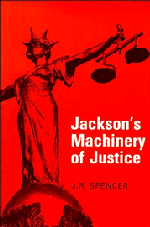Book contents
- Frontmatter
- Contents
- Acknowledgements
- List of figures
- List of tables
- Preface
- Preface to the first edition of ‘The Machinery of Justice in England’
- Abbreviations
- I Historical introduction
- 1 The courts
- 2 The common law
- 3 Trial at common law
- II Civil jurisdiction
- III Tribunals
- IV Criminal jurisdiction
- V The personnel of the law
- VI The European dimension
- VII The cost of the law
- VIII Law Reform
- Appendix A The Report of the Civil Justice Review
- Table of Cases cited
- Table of Statutes cited
- Table of Stationery Office publications cited
- Index
1 - The courts
Published online by Cambridge University Press: 10 January 2011
- Frontmatter
- Contents
- Acknowledgements
- List of figures
- List of tables
- Preface
- Preface to the first edition of ‘The Machinery of Justice in England’
- Abbreviations
- I Historical introduction
- 1 The courts
- 2 The common law
- 3 Trial at common law
- II Civil jurisdiction
- III Tribunals
- IV Criminal jurisdiction
- V The personnel of the law
- VI The European dimension
- VII The cost of the law
- VIII Law Reform
- Appendix A The Report of the Civil Justice Review
- Table of Cases cited
- Table of Statutes cited
- Table of Stationery Office publications cited
- Index
Summary
The present system of courts of law in England and Wales depends almost entirely on legislation passed during the last 150 years. Yet it is difficult to describe the present system without referring to older courts, because the functions of some of the newer courts have been defined in terms of the older institutions; the legislative changes did not so much sweep away the debris of centuries as take materials that were to hand and from them fashion a new design. When our superior courts were rehoused in the Strand, in 1882, they were given a huge neo-Gothic building. It would have symbolised our legal institutions much better if the architect had made a building out of all the styles and dates to be found in the country. The past history of our courts is also responsible for a curious distinction being made between courts of law (often called ‘ordinary courts’) and special tribunals. This is not a distinction of function, but a distinction of age. During the last century, Parliament entrusted some judicial and quasi-judicial functions to various persons or bodies; if this process had occurred at a more remote time, these tribunals would now be ‘ordinary’ courts. To ignore these tribunals would lead to a lop-sided view of the administration of justice.
- Type
- Chapter
- Information
- Jackson's Machinery of Justice , pp. 3 - 10Publisher: Cambridge University PressPrint publication year: 1989

